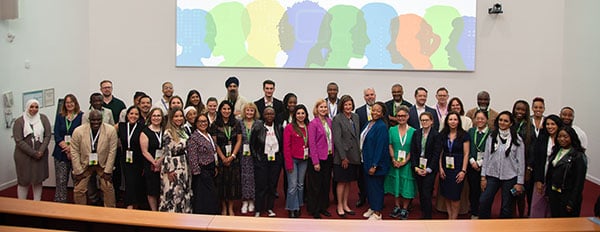ISC2 held its second annual Global Diversity, Equity & Inclusion Summit from Tuesday, July 2 to Wednesday, July 3 across the United Kingdom. The theme of the in-person summit, "Perspectives,” brought cybersecurity leaders together to explore how understanding and elevating varying viewpoints is crucial for a sustainable and thriving cybersecurity profession. The two-day experience focused on providing actionable solutions to diversify the profession by offering a half-day employability workshop for students and young professionals in partnership with CSE Connect, as well as opportunities to learn from peers and industry leaders through hands-on breakout sessions.
The event welcomed professionals in the government, academia, non-profit, and the private sector to share their experiences implementing inclusivity initiatives at their organizations. Attendees worked together on putting forward actionable solutions to advance diversity in the cybersecurity profession. A truly global event, insights from around the world were heard from colleagues who hail from North America, Asia, Europe, Africa and South America. Attendees gained greater appreciation for the responsibility that organizations like ISC2 have in advancing diversity and inclusion in cybersecurity, as well as the lasting impact individuals can make when they collaborate, ideate and innovate with one another.
Explore a recap and highlights from the summit below:
Opening Keynote Speaker: Dr. Claudia Natanson, MBE, CISSP, Chair, Board of Trustees, UK Cyber Security Council
Dr. Claudia Natanson, MBE , CISSP, Chair of the UK Cyber Security Council, was the opening keynote speaker. Dr. Natanson shared her personal journey into the industry with the audience, highlighting moments where she embraced being fearless while still being true to herself and her roots.
She provided a blueprint for achieving real change which she defined as the 3Cs; courage, confidence and commitment.
“First, you must have the courage to transform your dreams into a concrete vision and silence your own doubts or the opinions of skeptics,” said Dr. Natanson.
Next, she explained that you need the confidence to remain true to your vision and put forward actionable steps to turn it into a reality. Lastly, you need to remain committed to achieving your vision until it brings about change, remembering to constantly revisit your motivations when you feel stuck and pivot when necessary to keep pushing forward.
Talent Pipeline Perspective Panel Discussion
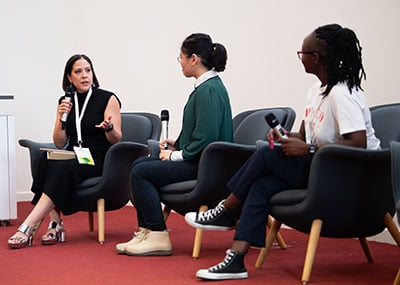 Angela Bergsma, Senior Program Manager at Palo Alto Network and Founder & President of Latinas in Cyber, served as the moderator of the first panel discussion at the summit.
Angela Bergsma, Senior Program Manager at Palo Alto Network and Founder & President of Latinas in Cyber, served as the moderator of the first panel discussion at the summit.
Panelists included:
- Ramsha Kiran, MSc Information Security and Digital Forensics Student, University of East London
- Nadia Aimé, Cybersecurity Specialist, Microsoft
The panel began by sharing research from ISC2’s 2021 global qualitive study on the state of diversity in the cybersecurity procession, which concluded that diverse professionals face unique challenges in the industry. Panelists spoke to these challenges by sharing their own stories along with leading practices they believe can help diverse professionals achieve success in the field, especially those trying to secure their first cyber role.
Ramsha provided her perspective as a current student studying information security at the University of East London and said that she is looking forward to working with diverse professionals upon graduation. She shared personal anecdotes about the hurdles she’s faced during herstudies and what motivates her to continue forging her own path in the field.
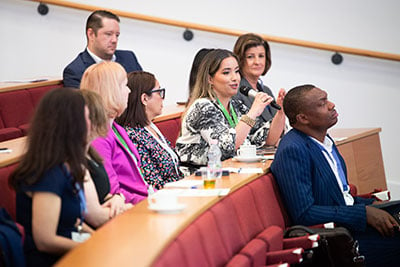
Nadia spoke about the importance of empowering job seekers from underrepresented communities, as they are often overlooked. She described how she spent her career engaging with stakeholders across the globe to source diverse talent, and how she continues to challenge organizations to hire candidates from varying backgrounds.
In addition to recruiting more diverse candidates, Nadia commented on the issue of retention in the industry and the strides Microsoft has made towards creating a work environment where employees feel valued and seen. Drawing from her own experience being the only woman in the room on many occasions, she emphasized that “representation, open communication, and community-building are key to retaining fulfilled employees and I am an example of how it can and should work to bring others in.”
Tackling the DEIB Challenge Head On—the DEIB Leaders’ Perspective
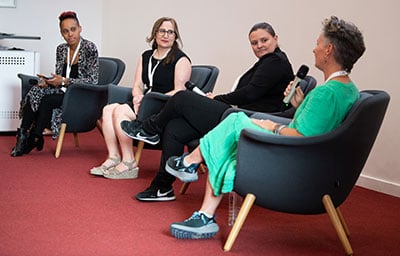 Mari Galloway, CISSP, CEO & Founding Board Member of Women’s Society of Cyberjutsu, moderated the second panel discussion.
Mari Galloway, CISSP, CEO & Founding Board Member of Women’s Society of Cyberjutsu, moderated the second panel discussion.
Panelists included:
- Shahrzad Zargari BSc (Hons), MSc, PhD, Senior Lecturer in Computer Systems and Networks; Course Leader in Cyber Security with Forensics & Steering Board Member, Ethnic Minorities in Cybersecurity
- Nina Olesen, Head of Sector, European Cyber Security Organisation (ECSO) & COO, Women4Cyber Foundation
- Stephanie Aldridge, Founder, CyberTBC & Director, NeuroCyber
Each panelist discussed the importance of advancing innovative approaches to promoting diversity, equity and inclusion in cybersecurity and highlighted effective strategies from their own work as leaders in the field. They offered insights on topics like gender equity, increasing representation, and building bridges between sectors to strengthen diversity efforts.
Nina provided her perspective as the COO of Women4Cyber on the methods behind creating successful programs and initiatives to boost the representation on women in cybersecurity.
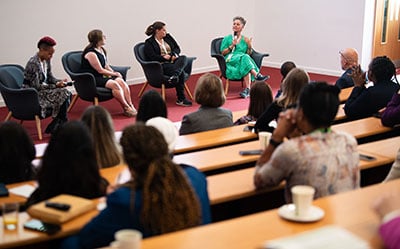
As both a lecturer and leader within Ethnic Minorities in Cyber, Shahrzad spoke about her dedication to increasing diversity by forging partnerships between educational institutions and cyber organizations.
WiCyS State of Inclusion Report Out
Lynn Dohm, Executive Director of Women in CyberSecurity (WiCyS), provided a comprehensive overview of the organization’s latest State of Inclusion Report. She highlighted issues that women in cybersecurity face, citing widespread challenges like lack of resources, inadequate advancement opportunities, and limited access to role models or mentors.
Going beyond statistics, she shared a personal story about her own daughter’s struggles to persevere as a young woman within a male dominated industry. The isolation and lack of support her daughter experienced during her studies ultimately led her to choose another career field, which demonstrates why it’s so important to create environments where people feel true inclusion and belonging.
She underscored that it is a security risk if diverse perspectives, including those of women and people of color, are not being taken into consideration. An inclusive and diverse cyber ecosystem is crucial to creating a safer, more secure world.
Global Perspectives Breakout Sessions
Throughout the day, participants had the opportunity to glean from diverse perspectives on the state of diversity from various regions around the globe. These breakout sessions—including, North America, Asia-Pacific, Europe/Middle East/Africa and Latin America—featured industry experts who outlined the successes, challenges and what’s on the horizon in their global region. They detailed the cyber ecosystem and shared successful case studies on what is working to ensure a more inclusive cyber industry.
Closing Keynote Speaker: Dr. Ameer Al-Nemrat,
Reader in Cyber Security & Director for the Cyber Security and AI Centre, University of East London
Dr. Ameer Al-Nemrat, Director for the Cyber Security and AI Centre, concluded the summit on a perfect note by encouraging everyone to continue doing their part to bring greater diversity and inclusion to cybersecurity on a global scale. He also reminded us that it is not just enough for those that were in the room but that we all must spread knowledge, commitment and passion to those throughout the entire ecosystem to make lasting and impactful changes.
This year’s summit continued to highlight the impactful work that the global cybersecurity ecosystem is doing to increase the representation of underrepresented groups in the profession, and further bolsters ISC2’s ongoing commitment to support the cyber workforce of the future. Although many great strides have been made, there is still more work to do to ensure a vibrant and sustainable future for the profession.
To learn more about ISC2’s diversity, equity and inclusion initiative and global activities, visit isc2.org/dei.
